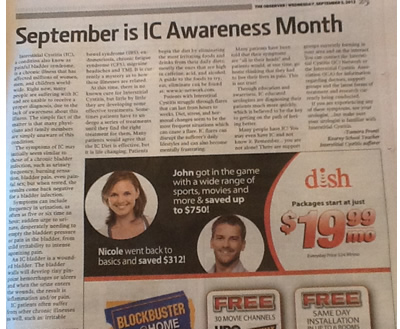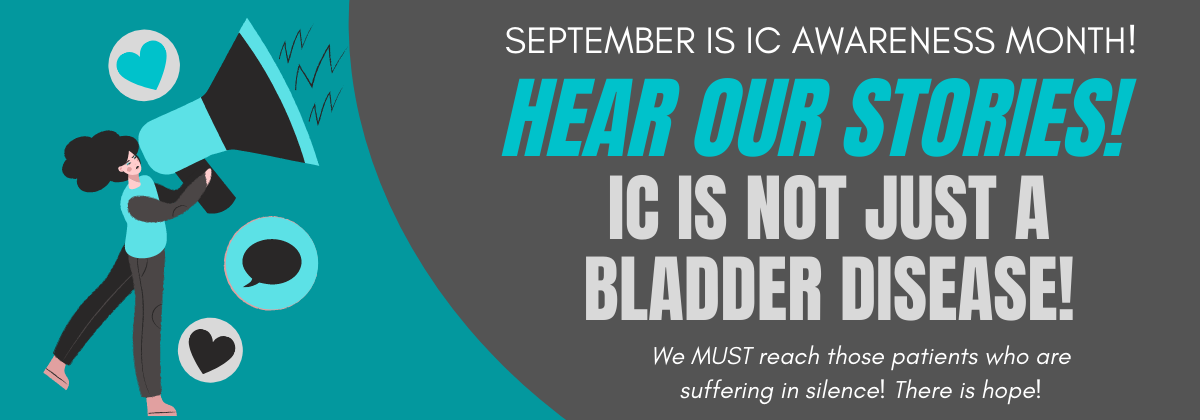
Congratulations to Tamara Pronti who was successful in placing an article about Interstitial Cystitis in her local paper, The Observer!
Here is the full text of her article!
Do You Have Interstitial Cystitis?
NO? Are you sure?
September is IC Awareness Month
Interstitial Cystitis (IC), a condition also known as painful bladder syndrome, is a chronic illness that has affected millions of women, men, and children worldwide. Right now, many people are suffering with IC and are unable to receive a proper diagnosis, due to the lack of awareness about this illness. The simple fact of the matter is that many physicians and family members are simply unaware of this condition.The symptoms of IC may initially seem similar to those of a chronic bladder infection, such as urinary frequency , burning sensation, bladder pain, even painful sex; but when tested, the results come back negative for a bladder infection.
Symptoms can include frequency in urination, as often as five or six times an hour; sudden urgency to urinate, desperately needing to empty the bladder; pressure or pain in the bladder, from mild irritability up to intense agonizing pain.
An IC bladder is a wounded bladder. The bladder wall develops tiny pinpoint hemorrhages or ulcers and when the urine enters the wounds, the result is inflammation and/or pain.
IC patients often suffer from other chronic illnesses as well, such as: irritable bowel syndrome (IBS), endometriosis, chronic fatigue syndrome (CFS), migraine headaches and TMJ. It is currently a mystery as to how these illnesses are related.
At this time, there is no known cure for Interstitial Cystitis, but little by little they are developing some effective treatments. Sometimes patients have to undergo a series of treatments until they find the right treatment for them. Many patients would agree that the IC Diet is effective, but it is life changing. Patients begin the diet by eliminating the most irritating foods/drinks from their daily diets; mostly the ones that are high in caffeine, acid, and alcohol. A guide to the foods to try, eat, and eliminate can be found at: www.ic-network.com.
Patients with Interstitial Cystitis struggle through flares that can last from hours to weeks. Diet, stress, and hormonal changes seem to be most frequent situations which can cause a flare. IC flares can disrupt the sufferer’s daily lifestyles and can also become mentally frustrating.
Many patients have been told that their symptoms are “all in their heads” and patients would, at one time, go home thinking that they had to live their lives in pain. This is not true! Through education and awareness, IC educated urologists are diagnosing their patients much more quickly, which is believed to be the key to getting on the path of feeling better.
Many people have IC! You may even have IC and not know it. Remember… you are not alone! There are support groups currently forming in your area, and on the internet. You can contact the Interstitial Cystitis (IC) Network or the Interstitial Cystitis Association (ICA) for information regarding: doctors; support groups; and the latest forms of treatment and research currently being conducted.
If you are experiencing any of these symptoms see your urologist, but make sure your urologist is familiar with Interstitial Cystitis.
–Tamara Pronti
Kearny School Teacher
Interstitial Cystitis sufferer
